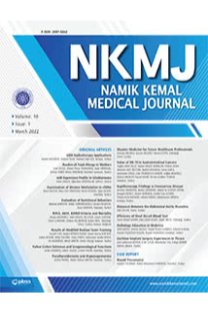KANSER HASTALARINDA UYKU KALİTESİNİ ETKİLEYEN FAKTÖRLER
Beck Depresyon Envanteri, Pittsburgh Uyku Kalitesi Endeksi, Uyku Bozuklukları
FACTORS OF AFFECTING SLEEP QUALITY IN CANCER PATIENTS
___
- 1. Passik S.D, Whitcomb L.A, Kirsh K.L ,Theobald D.E. An unsuccessful attempt to develop a single-item screen for insomnia in cancer patients. Journal of Pain and Symptom Management 2003: 25; 284-7. 2. Steindorf K, Clauss D, Tjaden C, Hackert T, Herbolsheimer F, Bruckner T, et al. Quality of Life, Fatigue, and Sleep Problems in Pancreatic Cancer Patients—A Randomized Trial on the Effects of Exercise . Dtsch Arztebl Int. 2019 ;116:471-8. 3. Mollayeva T, Thurairajah P, Burton K, Mollayeva S, Shapiro CM, Colantonio A. The Pittsburgh sleep quality index as a screening tool for sleep dysfunction in clinical and non-clinical samples: A systematic review and meta-analysis. Sleep Med Rev. 2016 ;25:52-73. 4. Beck S.L, Schwartz A.L, Towsley G, Dudley W, Barsevick A. Psycho- metric evaluation of the Pittsburgh Sleep Quality Index in cancer patients. Journal of Pain and Symptom Management 2004 ;27:140-8. 5. de Kock I, Mirhosseini M, Lau F, Thai V, Downing M, Quan H, et al. Conversion of Karnofsky Performance Status (KPS) and Eastern Cooperative Oncology Group Performance Status (ECOG) to Palliative Performance Scale (PPS), and the interchangeability of PPS and KPS in prognostic tools. J Palliat Care. 2013 ;29:163-9. 6. Morris JL, Rohay J, Chasens ER. Sex Differences in the Psychometric Properties of the Pittsburgh Sleep Quality Index. J Womens Health (Larchmt). 2018 ;27 :278-82. 7. Wang YP, Gorenstein C. Psychometric properties of the Beck Depression Inventory- II: a comprehensive review. Braz J Psychiatry. 2013 ;35:416-31. 8. Julian LJ. Measures of anxiety: State-Trait Anxiety Inventory (STAI), Beck Anxiety Inventory (BAI), and Hospital Anxiety and Depression Scale-Anxiety (HADS-A). Arthritis Care Res (Hoboken). 2011;63 :467-72. 9. Savard J, Laroche L, Simard S, Ivers H, Morin C.M. Chronic insomnia and immune functioning. Psychosomatic Medicine 2003; 65, 211-21. 10. Carpenter JS, Andrykowski MA. Psychometric evaluation of the Pittsburgh Sleep Quality Index. J Psychosom Res 1998;45: 5-13. 11. Forter BV, Stepanski EJ, Wang SC, Kasprowicz S, Durrence HH. Sleep and quality of life in breast cancer patients. J Pain Symptom Manage 2002;24: 471-80. 12. Savard J, Morin CM. Insomnia in the context of cancer: a review of a neglected problem. J Clin Oncol 2001; 19:895-908. 13. Davidson JR, MacLean AW, Brundage MD, Schulze K. Sleep disturbance in cancer patients. Soc Sci Med 2002;54: 1309-21. 14. Byles JE, Mishra GD, Harris MA. The experience of insomnia among older women. Sleep 2005;28: 972-9. 15. Greenberg D.B, Gray J.L, Mannix C.M, Eisenthal S, Carey M. Treatment-related fatigue and serum interleukin-1 levels in patients during external beam irradiation for prostate cancer. Journal of Pain and Symptom Management. 1993; 8 ; 196-200. 16. Theobald DE. Cancer pain, fatigue, distress, and insomnia in cancer patients. Clin Cornerstone 2004;6 ;15-21. 17. Murphy PJ, Badia P, Myers BL, Boecker MR, Wright KP Jr. Nonsteroidal anti-inflammatory drugs affect normal sleep patterns in humans. Physiol Behav. 1994;55:1063-6. 18. Roth T, Drake C. Evolution of insomnia: currents status and future direction. Sleep Med 2004;5: 23-30. 19. Buysse DJ. Insomnia, depression and aging Assessing sleep and mood interactions in older adults. Geriatrics 2004;59: 47-51. 20. Kuo H.H., Chiu M.J., Liao W.C., Hwang S.L. Quality of sleep and related factors during chemotherapy in patients with stage I/II breast cancer. Journal of the Formosan Medical Association. 2006; 105: 64-9.
- ISSN: 2587-0262
- Yayın Aralığı: 4
- Başlangıç: 2013
- Yayıncı: Galenos Yayınevi
KURT POSTUNDA KOYUN MU VEYA KOYUN KOYUN POSTUNDA KURT MU? KERATOAKANTOM
Fatma BİLGEN, Alper URAL, Mehmet BEKERECİOĞLU
Nukleus akumbens bölgesine uygulanan topiramatın morfin yoksunluk sendromu üzerine etkileri
Songül ÖZKULA, Oya Helin DUNDAR, Selcuk EROL, Ramazan BAKAR, Heja GECİT, N. Eymen TURAN, M. Fırat BALIK, Hasan YANANLI, Rezzan GÜLHAN, Mahluga JAFAROVA DEMİRKAPU
Aşı uygulamalarında ikincil kazanımlar
Burçin NALBANTOĞLU, Emine Gülbin GÖKÇAY
KANSER HASTALARINDA UYKU KALİTESİNİ ETKİLEYEN FAKTÖRLER
Nilay ŞENGÜL SAMANCI, Emir CELİK, Ezgi DEGERLİ, Melih KASAP, Kerem ORUC, Sahin BEDİR, Sumeyra DERİN, Nihan SENTURK, Burc POYRAZ, Zeynep TURNA, Fuat DEMİRELLİ
Ayça TÜRER CABBAR, Mehmet EREN
Türkiye’de Yaşa Bağlı Maküla Dejenerasyonunda Endikasyon Dışı İlaç Kullanımı
Hanife RAHMANLAR, Cemile ÜÇGÜL ATILGAN, Mehmet ÇITIRIK, Ali ALKAN, Hakkı GÜRSÖZ
Kranial MRG İncelemesi Sonrası Postural Stabilitenin Biodeks Denge Sistemi İle Değerlendirilmesi
Meltem ÖZNUR, Murat AKGÜL, Ayşegül İSAL ARSLAN, Cenk Murat YAZICI, Enes ALTIN
